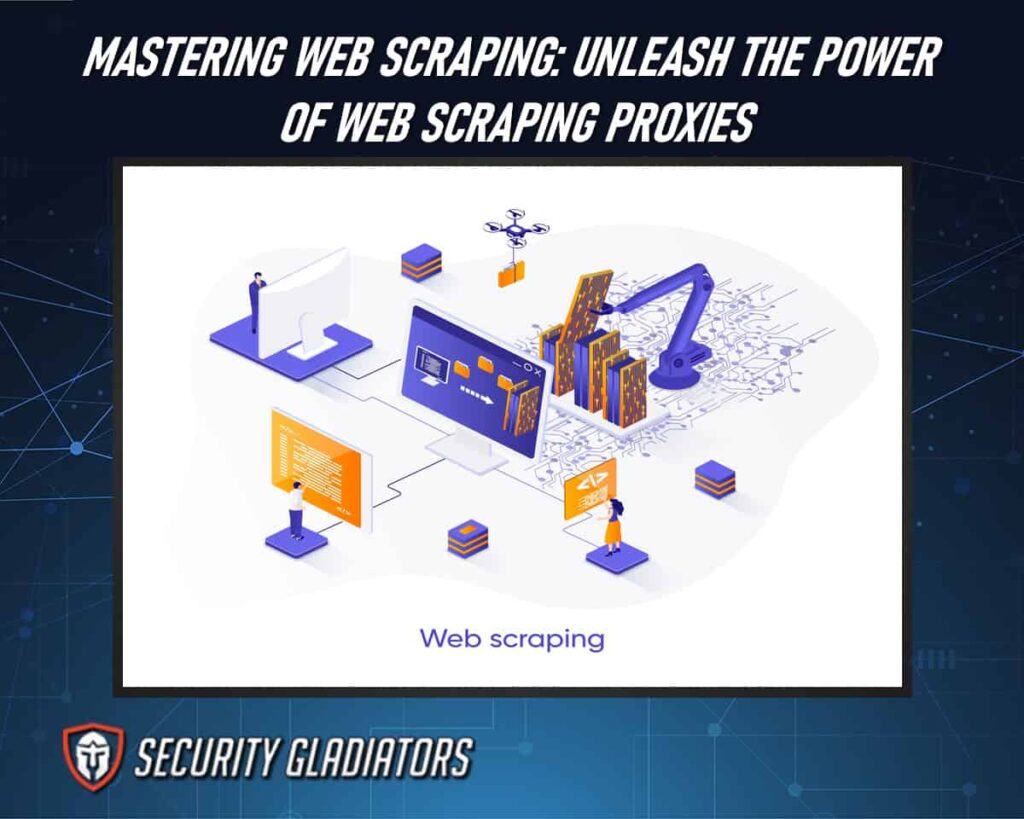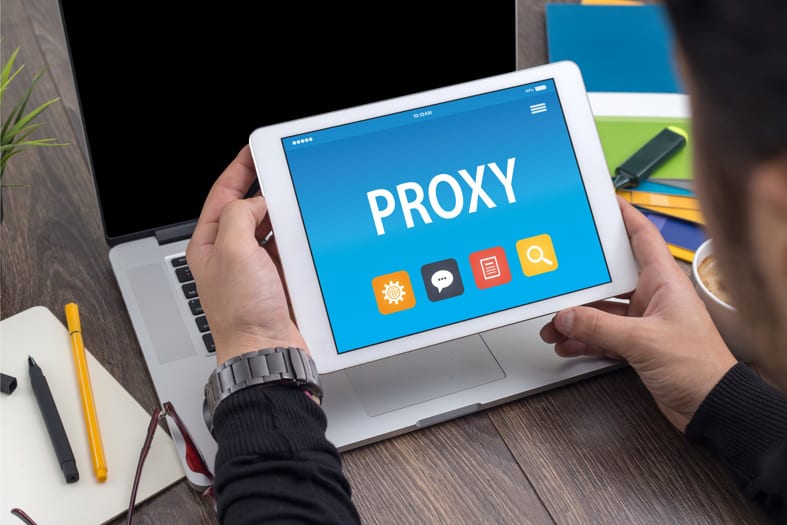
Table of Contents
What Is Web Scraping?
Web Scraping is a process of collecting data from websites in an automated manner. It is the most efficient way for businesses to access and store large amounts of online data. The process can be used to extract information such as product specifications, price comparison, contact details, images, content from social media platforms, and more.
Proxy services play an important role in web scraping by enabling anonymous access to websites. Proxy providers offer proxy server solutions with proxy rotation capabilities that help different IP addresses to be used at different times for data extraction purposes. This helps users avoid being blocked or banned by sites due to excessive requests coming from a single IP address. Moreover, it also provides additional features such as user agent rotation which can help mimic multiple browsers and devices when accessing data on the web thus avoiding detection by anti-spider software programs employed by websites.
Proxies can allow you to access geo-restricted content or limited to specific regions. By connecting to a proxy server in a different country, you can make it appear as if you are browsing from that location, thereby bypassing the geo-restriction. Proxies act as intermediaries between your device and the internet. When you connect to a website through a proxy, it masks your IP address, making it appear as if the request is originating from the proxy server’s IP address. This can help bypass IP-based restrictions imposed by content filters.
Web scraping proxies enable organizations around the world with no prior experience in coding or programming language skills to effectively manage large-scale projects related to data extraction from various websites without compromising on performance or accuracy levels expected out of their applications. The power of this technology lies in its ability not only to allow businesses to gain valuable insights into customer behavior but also to optimize business processes leading towards improved customer satisfaction levels and greater efficiency in operations overall.
What Are Benefits of Using Web Scraping Proxies?
Utilizing web scraping proxies can provide numerous advantages, such as improved accuracy of gathered information and enhanced security of the data extraction process. Proxies for web scraping are specialized tools that allow users to access websites through a third-party server while masking their IP addresses. These tools help protect user identities from being detected by websites and can also be used to bypass geolocation restrictions.
The use of web scraping proxies provides a number of benefits for businesses looking to extract data from various websites on the internet. It is possible to collect large amounts of data quickly and efficiently without any risk or hassle associated with traditional methods. Additionally, when using a proxy network, the risk of getting blocked by anti-scraping measures on certain sites is significantly reduced compared to other methods. This increased efficiency allows companies to focus more on analyzing and utilizing the collected data rather than worrying about potential risks associated with extracting it.
Web scraping proxies offer an effective way for businesses to gain insights into their customers or competitors in order to make better decisions regarding marketing strategies or product development initiatives. By relying on reliable proxy services when gathering online data, organizations can ensure that they have access to up-to-date information at all times without risking their reputation or safety due to inappropriate activities associated with data extraction processes.
Note:
Remember, proxies themselves do not offer encryption. However, there are certain types of proxies that can work in conjunction with encryption protocols to provide an encrypted connection such as HTTPS and VPNs.Types of Proxies for Web Scraping
When it comes to web scraping, proxies are often used to mask the IP address of the scraper and rotate through multiple IP addresses to avoid getting blocked by websites. There are several types of proxies commonly used for web scraping:

Residential Proxies
Residential proxies are IP addresses provided by Internet Service Providers (ISPs) to homeowners. They are considered legitimate and trustworthy because they belong to real residential devices. Residential proxies are highly effective for web scraping as they mimic regular user traffic.
Datacenter Proxies
Datacenter proxies are IP addresses provided by datacenters or proxy service providers. These proxies are not associated with Internet Service Providers and do not originate from residential devices. They are often cheaper and faster than residential proxies, but their usage can sometimes raise suspicion since they are commonly used by scrapers and bots.
Rotating Proxies
Rotating proxies are a type of proxy that offers automatic proxy rotation between multiple IP addresses during the scraping process. This rotation helps prevent IP blocking and ensures that the scraper’s requests come from different addresses. This is because it can be challenging to have the same IP address for a web scraping project that takes long. Rotating proxies can be either residential or data center proxies.
Dedicated Proxies
Dedicated proxies provide a single IP address exclusively for the scraper’s use. These proxies offer more control and stability since the IP address is not shared with other users. Dedicated proxies can be either residential or data center proxies.
Reverse Proxies
Reverse proxies act as intermediaries between the scraper and the target website. They receive the scraper’s requests and forward them to the website on behalf of the scraper. Reverse proxies can help hide the scraper’s IP address and improve anonymity.
Proxy Networks
Proxy networks are large networks of residential IP addresses that are pooled together and offered as a service. These networks provide a wide range of IP addresses from various locations and rotate them automatically. Proxy networks are often used for high-scale web scraping projects.
Of all the six proxies, residential proxies are the best.
The Risks of Web Scraping
The process of web scraping can present a variety of potential risks to businesses that must be mitigated in order to ensure data security and accuracy. These risks are largely related to the lack of anonymity and privacy when harvesting data from target websites. Here are some potential risks associated with web scraping:
Legality
Web scraping may violate the terms of service or the copyright of a website. Some websites explicitly prohibit scraping in their terms and conditions. Before scraping a website, it is essential to review its terms of service and seek permission if required.
Intellectual Property Infringement
Scraping copyrighted or proprietary information without proper authorization can lead to legal issues. Extracting and using someone else’s data, such as copyrighted text, images, or databases, can infringe upon intellectual property rights.
Technical Challenges
Websites may employ various measures to prevent or deter scraping, such as CAPTCHAs, IP blocking, or anti-scraping mechanisms. Overcoming these technical barriers may require additional efforts and resources.
Impact on Server Performance
Scraping a website can put a significant load on its servers, especially if done excessively or with concurrent requests. This increased traffic can degrade the website’s performance and disrupt its regular users. Such activity may be considered as a denial of service (DoS) attack and can result in legal consequences.
Data Accuracy and Quality
Web scraping relies on the assumption that the data on a website is accurate and up-to-date. However, websites can change their structure or content, leading to scraped data becoming outdated or irrelevant. It is essential to regularly validate and verify the scraped data for accuracy and consistency.
Ethical Considerations
Web scraping may raise ethical concerns, particularly when it involves personal or sensitive information. Scraping such data without proper consent or safeguards can compromise user privacy and lead to misuse or unauthorized disclosure of information.
Reputation and Trust
If web scraping is perceived negatively or used for malicious purposes, it can damage the reputation and trustworthiness of the scraper or the organization associated with the scraping activity. This can have legal, financial, and business implications.
It is also good to understand risks that come with free proxies with regard to security. Free proxies may not prioritize security, and some may even be operated by malicious actors. When using a free proxy, you run the risk of your data being intercepted, monitored, or manipulated. This can lead to unauthorized access to your sensitive information, including passwords, financial data, or personal communications. However, not all free proxies are bad, that why you should conduct a research about them before applying.
How to Securely Use Web Scraping Proxies
When using web scraping proxies, it is important to follow certain practices to ensure the security of your scraping activities. Here are some guidelines to securely use web scraping proxies:
Choose Reputable Proxy Providers
Selecting a trustworthy proxy provider is crucial to ensure the security of your web scraping activities. Look for providers with a good reputation, positive customer reviews, and transparent policies regarding data privacy and security.
Use Residential Proxies
Residential proxies are IP addresses assigned to real residential devices, making them more reliable and less likely to get blocked. They offer higher anonymity and reduce the risk of detection while scraping. Residential proxies also help avoid triggering anti-scraping measures implemented by websites.
Rotate Proxy IPs and User Agents
To avoid detection and prevent IP blocking, it’s important to rotate your proxy IPs and user agents regularly. This helps to simulate natural browsing behavior and reduces the chances of being identified as a bot.
Implement IP Rotation and Rate Limiting
Set up a mechanism to rotate the IP addresses and limit the request rate to avoid triggering rate limits or being blocked by websites. This can be done by using a proxy management tool or coding your scraping script to automatically switch proxies and control request frequency.
Handle Cookies and Sessions
Many websites use cookies and sessions to track user activity. To ensure a secure scraping process, handle cookies and sessions properly. Clear cookies between requests or use separate sessions for each scraping task to avoid being flagged as suspicious.
Respect Website Terms of Service
Always review and comply with the terms of service of the websites you are scraping. Some websites may explicitly prohibit web scraping or impose limitations on the frequency and volume of requests. Adhering to these guidelines helps maintain a legal and ethical approach to web scraping.
Monitor and Analyze Response Codes
Keep track of the response codes returned by the websites you scrape. Watch out for error codes, such as 429 (Too Many Requests), which indicate that you may be making excessive requests. Monitoring these codes allows you to adjust your scraping behavior accordingly.
Handle Sensitive Data Securely
If your scraping involves handling sensitive data, such as personally identifiable information (PII), ensure that you handle it securely. Implement appropriate encryption measures, store the data securely, and follow data protection regulations to safeguard the privacy of individuals.
Regularly update and maintain your scraping infrastructure: Stay up to date with the latest security patches, software updates, and proxy configurations. Regular maintenance helps protect your scraping infrastructure from vulnerabilities and ensures optimal performance and security.
Choosing the Right Web Scraping Proxy
When choosing the right web scraping proxy, it’s important to consider several factors to ensure the effectiveness and reliability of your scraping activities. Here are some key points to consider:
Proxy Type
There are different types of proxies available, including datacenter proxies, residential proxies, and rotating proxies. Each type has its own advantages and disadvantages. Datacenter proxies are generally more affordable but may be more easily detected and blocked by websites. Residential proxies, on the other hand, use IP addresses associated with real residential devices, offering higher anonymity and reliability. Rotating proxies automatically switch between different IP addresses, helping to avoid detection and IP blocking.
Proxy Pool Size
The size of the proxy pool refers to the number of available proxy IP addresses that the provider offers. A larger proxy pool size increases the chances of finding reliable and available proxies for your scraping needs. It also helps distribute the load among different IP addresses, reducing the risk of being detected and blocked by websites.
Location Coverage
Depending on your scraping requirements, you may need proxies from specific geographical locations. If you are targeting region-specific data or need to comply with location-based restrictions, choose a proxy provider that offers a wide range of proxy locations.
Proxy Speed and Performance
The speed and performance of proxies are crucial for efficient web scraping. Slow proxies can significantly slow down your scraping process and affect overall productivity. Look for proxy providers that offer fast and reliable connections, low latency, and high uptime guarantees.
Connection Limitations
Some proxy providers impose limitations on the number of concurrent connections or the amount of data you can scrape. Ensure that the proxy provider you choose offers sufficient connection limits that align with your scraping requirements.
Proxy Authentication
Proxy authentication allows you to secure your scraping activities and restrict access to your proxies. Choose a proxy provider that offers authentication methods such as username/password, IP whitelisting, or token-based authentication to ensure that only authorized users can access the proxies.
Scalability and Flexibility
Consider the scalability and flexibility of the proxy service. If you anticipate increasing your scraping needs in the future, choose a provider that can accommodate your growing requirements without compromising performance or increasing costs significantly.
Reputation and Customer Support
Research the reputation of the proxy provider and check customer reviews and ratings. A reputable provider with positive feedback indicates reliability and quality service. Additionally, ensure that the provider offers responsive customer support to address any issues or queries you may have during your scraping process.
Cost
Finally, consider the pricing plans and affordability of the proxy service. While cost shouldn’t be the sole deciding factor, it’s important to choose a provider that offers a balance between quality and price that aligns with your budget.
Understanding Web Scraping Laws
Having discussed the importance of choosing the right web scraping proxy, it is essential to understand web scraping laws. Web scraping activities are regulated by different laws in various countries and regions. Consequently, understanding them is a crucial part of any successful data extraction project. The main source of legal guidance when conducting web-scraping activities comes from copyright law. This type of activity might be seen as a violation of copyright if conducted without permission or for commercial purposes. Moreover, countries can have specific regulations related to data privacy and protection that could interfere with web scraping projects. It is important for businesses to comply with these regulations as non-compliance could lead to serious consequences such as financial penalties or even criminal liability in some cases.
To mitigate the risk associated with such activities, businesses should use quality proxies from a residential proxy network or dedicated proxy pool when conducting web-scraping operations. By using a reliable proxy ip service they can mask their identity and access geo-restricted sites while maintaining anonymity and compliance with applicable laws when collecting valuable data from these sources. Doing so will ensure that their online presence remains secure while unlocking the potential of powerful data extraction techniques like web scraping.
Best Practices for Using Web Scraping Proxies
When using web scraping proxies, it’s important to select a reliable provider that offers private residential IPs with fast speeds and high uptimes. Furthermore, having access to both shared and dedicated proxy servers will allow users to adjust their needs in accordance with the volume of data being scraped. Additionally, an automated system should be implemented for rotating IP addresses at regular intervals in order to avoid detection and ensure data accuracy. Using secure protocols such as SSL/TLS encryption is essential for protecting confidential information while transferring data from one party over the internet. To further enhance security measures when using web scraping proxies, users should always opt for two-factor authentication whenever possible in order to prevent unauthorized access attempts or malicious activities on their accounts.
Automating Web Scraping With Proxies
Automation of web scraping through the use of proxies can provide enhanced efficiency and productivity to organizations seeking to acquire information from the internet. Proxies are a technology that is used to route requests through multiple IPs, allowing for more efficient data extraction from websites. Mobile proxies, datacenter proxies, rotating proxies, and forward proxies are some of the most commonly used types of proxies when automating web scraping tasks. When combined with other automation processes such as scheduling, these proxies can be used to streamline a web scraping process that would otherwise be tedious and time-consuming.

By utilizing automated methods like Proxy servers together with other tools such as scheduling software, organizations can make significant improvements in their ability to extract relevant data quickly and accurately from different sources on the internet. This helps them gain actionable insights that could help guide strategic decisions and drive business growth in an efficient manner.
The Trends of Adopting a Web Scraping API
Adopting a web scraping API is becoming increasingly popular as organizations recognize the advantages of leveraging automated processes to access relevant data more quickly and accurately. With web scraping proxies, organizations can easily extract any kind of data from multiple sources with the help of a single API. This helps them save time and money while getting accurate and reliable results.
ZenRows is one such tool that includes a built-in proxy and has gained significant traction among companies. ZenRows is not just a regular proxy provider but a comprehensive tool that offers premium web scraping proxies. With its all-in-one approach, ZenRows simplifies the process of bypassing anti-bot measures. By making a single API call, users can benefit from features like rotating proxies, headless browsers, and CAPTCHA handling. The integrated proxy feature in ZenRows enables companies to overcome common challenges associated with web scrapings, such as IP blocking and anti-scraping measures implemented by websites. By leveraging the proxy infrastructure provided by ZenRows, companies can access and extract data from websites more reliably and efficiently, saving time and effort in managing their own proxies. Also, the inclusion of a proxy in ZenRows simplifies the setup and maintenance process. Companies don’t need to invest resources in configuring and managing a separate proxy infrastructure, as ZenRows takes care of proxy rotation and management. This streamlined approach reduces development time and costs, allowing companies to focus on their core data extraction needs and benefiting from higher anonymity and privacy during scraping activities.
Some key benefits of web scraping APIs are:
- Accessing free proxies for web crawling
- Extracting web data
- Automating tedious tasks
- Enhancing security measures
Frequently Asked Questions
Is There a Recommended Proxy Type for Web Scraping?
While there are many different types of proxies available for web scraping, determining which one is best suited for a particular task depends on various factors such as the data source, target website, and required speed. Generally speaking, dedicated proxies are considered to be more reliable than shared or rotating proxies due to their static IP address which ensures higher levels of anonymity and privacy. Moreover, residential IPs provide enhanced protection since they are assigned by Internet Service Providers (ISPs) and appear as if they originate from a real device. Therefore, depending on the specific requirements of a project in terms of security and performance, dedicated residential proxies may be recommended for web scraping.
Is There a Way To Reduce the Risk of Using Web Scraping Proxies?
To reduce the likelihood of exposure to such risks, web scraping proxies should be configured with optimal settings that minimize the chances of detection by a website’s security systems. Additionally, web scrapers should adhere to any guidelines set forth in a website’s terms of service. By doing so, organizations can safely leverage the power of web scraping proxies while minimizing potential legal and technical risks associated with their use.
How Do You Use Proxies in Python Web Scraping?
To use proxies in Python web scraping, you can follow these steps. First, import the necessary libraries, such as Requests or Scrapy, to perform web scraping tasks. Then, configure the proxy settings by providing the proxy IP address and port in your code. Next, make HTTP requests through the proxy bypassing the proxy settings as parameters in your requests. Finally, handle any errors or exceptions that may occur during the scraping process, such as connection errors or proxy authentication requirements, to ensure the smooth execution of your scraping script.
Is VPN or Proxy Better for Scraping?
The choice between VPN and a proxy for web scraping depends on specific requirements and considerations. VPNs provide a more comprehensive solution as they encrypt all internet traffic, ensuring privacy and security beyond just scraping activities. Proxies, on the other hand, are designed specifically for routing web traffic and can offer higher performance and flexibility in terms of IP rotation and geolocation. VPNs may be more suitable for scenarios where overall online privacy is a priority, while proxies are often favored for targeted web scraping tasks that require agility and scalability. Ultimately, the decision should be based on the specific needs and priorities of the scraping project.
Can You Get IP Banned for Web Scraping?
Yes, it is possible to get IP banned for web scraping. Websites often have measures in place to detect and block scraping activities, as they may consider it a violation of their terms of service. If a website detects excessive requests or suspicious behavior from an IP address, it may temporarily or permanently ban that IP. To avoid getting IP banned, it is important to use techniques such as rotating proxies, controlling request rates, and respecting website scraping policies. Additionally, utilizing residential proxies can help mimic real user behavior and reduce the likelihood of detection and banning.
Conclusion
The use of web scraping proxies has opened up a world of possibilities for data extraction. With the right combination of proxy type, security measures, and best practices in place, businesses can obtain vast amounts of data with relative ease. Additionally, automation technologies have allowed companies to increase the efficiency and effectiveness of their web scraping activities. By understanding the risks associated with unsecured web scraping and taking precautionary measures, businesses are able to extract valuable data while keeping their system secure. Web scraping is quickly becoming an essential tool for businesses looking to gain a competitive edge in the digital space.

